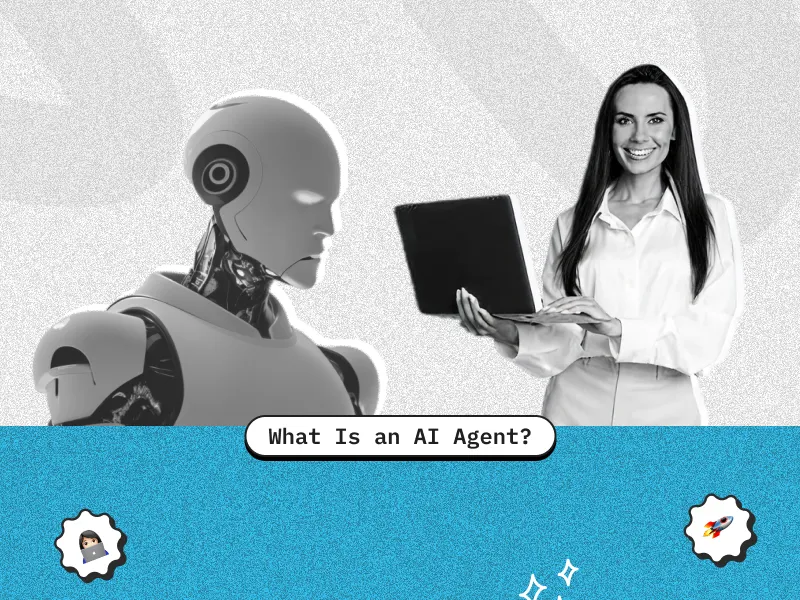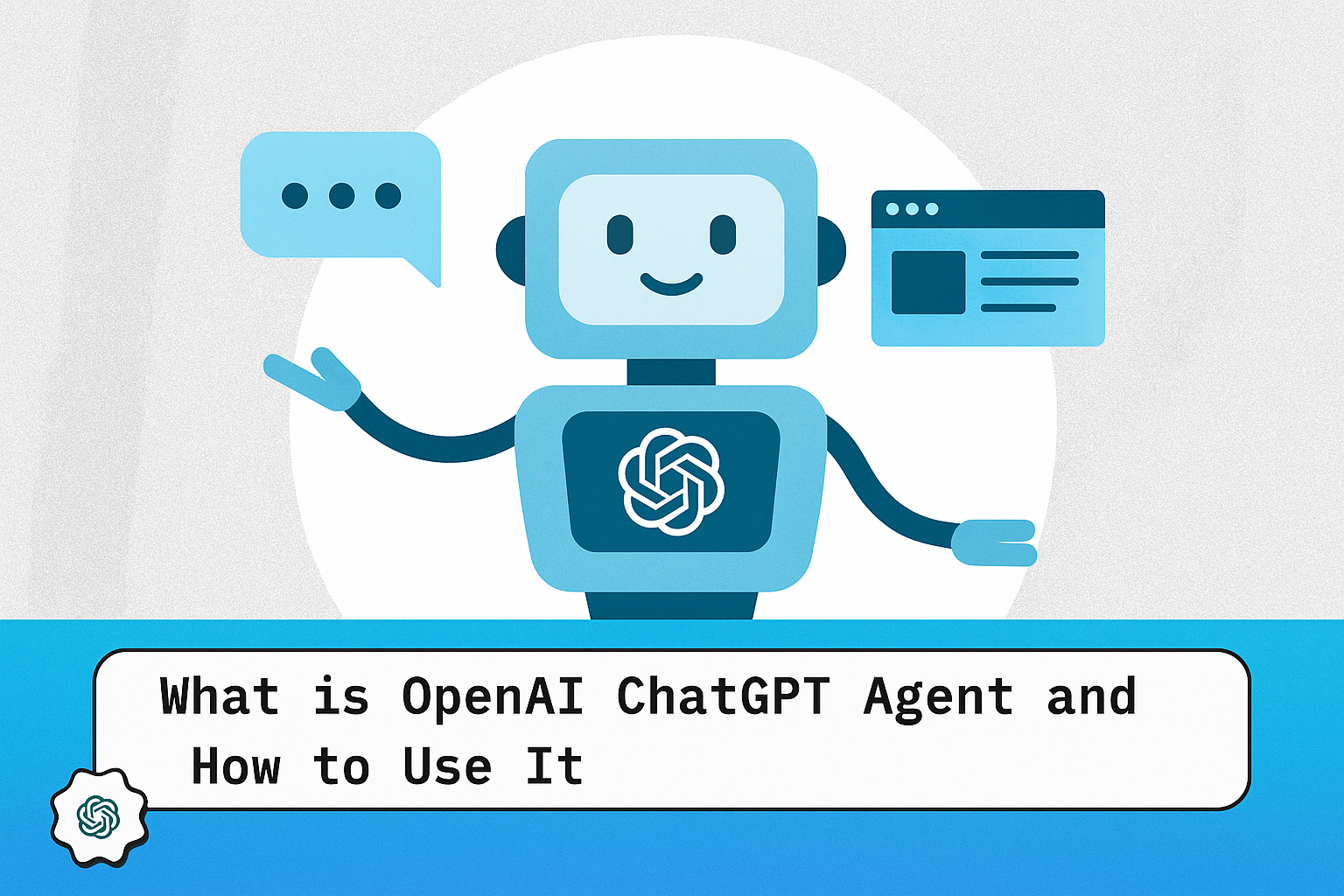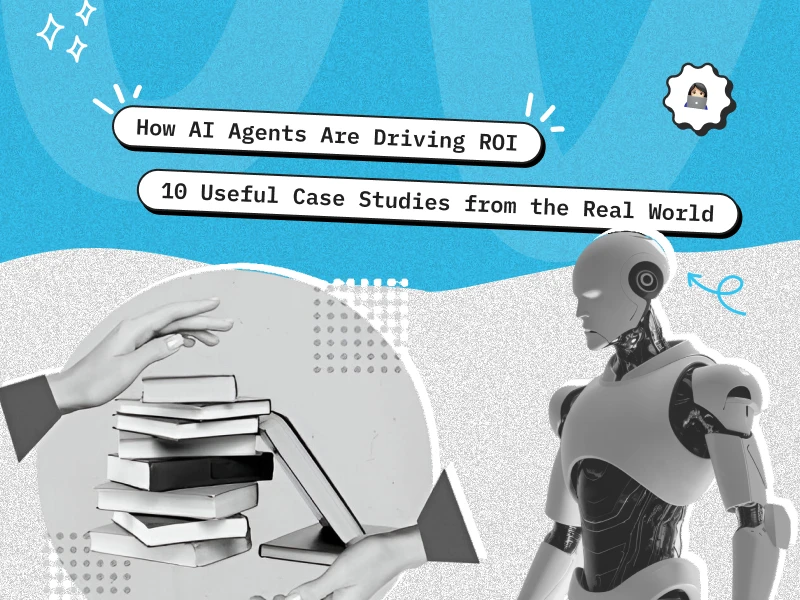TL;DR
- An AI agent is a software system that perceives inputs, reasons, plans, and acts to achieve goals with varying degrees of autonomy.
- Modern AI agents combine large models, planners, tool connectors, and memory to run multi-step workflows.
- Start with one clear, measurable use case, use human oversight early, and measure outcomes before scaling.
- Costs vary: prototypes can be cheap, production-grade agentic systems often require significant development and cloud spend.
- Work with an experienced provider when speed, compliance, or domain expertise matters.
Introduction
If you have ever wished a software assistant could read your inbox, prioritize actions, book meetings, or run parts of your business without constant supervision, you are describing an AI agent. Unlike one-off scripts or a simple chatbot that answers questions, an AI agent can plan, call tools, learn, and complete multi-step jobs.
This guide explains, step by step, what AI agents are, how they work, real business use cases, the risks to watch for, and how to build or buy the right solution for your business. If you plan to move faster, consider consulting an AI Agent Development Company that can help design and deploy agents with the right controls.
What is an AI agent?
An AI agent is a program that:
- Perceives the world around it through inputs such as text, images, audio, sensor data, or database queries.
- Decides what to do by interpreting that input, setting or accepting a goal, and choosing a plan.
- Acts by calling tools or APIs, writing messages, updating systems, or triggering physical processes.
- Learn from results by recording outcomes and improving future decisions.
Think of an AI agent as an employee who can read, think, and act across software systems without waiting for step-by-step instructions every time.
How AI Agents work, broken down
To design or evaluate an AI agent, know these core components.
Foundation model
This is the large language model or multimodal model that provides understanding and generative ability. It reads prompts, summarizes documents, writes messages, and helps reason about next steps.
Planner and policy
This component converts a goal (for example “fix this customer’s issue”) into a sequence of steps. It decides which tools to call and in what order.
Tool integration layer
Agents need to act. The tool layer contains connectors to your CRM, help desk, calendar, payment system, trading API, or custom database. Secure credentials and fine-grained permissions are essential here.
Memory and context store
Short-term memory holds the current task context. Long-term memory stores user preferences, past interactions, and lessons learned so the agent behaves consistently over time.
Reflection and learning loop
After an action, the agent assesses results. If something fails or the outcome is suboptimal, the agent updates its approach, either by adjusting the plan, changing tool parameters, or flagging human review.
Safety, monitoring, and human-in-the-loop
All production agents should include logging, human approval gates for risky actions, and monitoring dashboards. These guardrails stop errors and build user trust.
Agentive vs agentic: two ways to use agents
These two terms help you decide the right level of autonomy.
- Agentive approach: The AI acts like a smart assistant. It proposes actions and waits for approval for critical steps. Use this when decisions are high risk or explainability is required.
- Agentic approach: The AI has permission to run complete workflows end-to-end with limited supervision. This is efficient for routine tasks but needs strong safety measures.
For most small businesses, starting with agentive systems and moving to agentic for low-risk areas is the safest path.
Types of AI agents
Here is how agents are commonly categorized.
1. Simple Reflex Agents
These agents act only based on the current perception.
They do not consider the past or future.
They follow conditions–action rules.
Example:
If a customer writes “Reset password”, the agent immediately sends a password reset link.
Limitations:
- No memory
- Cannot handle ambiguous situations
- Fails when environment changes
2. Model Based Reflex Agents
These agents maintain a state of the world, meaning they remember something about past inputs.
They can handle partially observable environments.
Example:
A customer service agent that remembers:
- previous customer messages
- ticket history
- product version
Why important:
Most practical AI agents today fall into this category.
3. Goal Based Agents
These agents decide actions based on achieving a specific goal.
They require reasoning and planning.
Example:
A sales agent whose goal is:
- qualify the lead
- book a meeting
- update CRM
It evaluates available actions and chooses the ones that bring it closer to the goal.
4. Utility Based Agents
These agents choose actions based on utility, meaning how good or valuable a result is.
They weigh multiple outcomes and choose the best one.
Example:
A logistics agent may choose between:
- fastest route
- cheapest route
- most reliable route
It selects the action that maximizes utility.
5. Learning Agents
These agents improve over time by interacting with the environment.
They have components like:
- Learning element
- Performance element
- Critic
- Problem generator
Example:
A fraud detection agent that gets better as it processes more transactions.
If you want a primer, our page on Types of AI Agent covers examples that map to common business needs.
Real world use cases that actually deliver value
Below are use cases that give measurable returns.
Customer support and sales
Agents can classify tickets, draft responses, retrieve account context, update CRM fields, and escalate to human agents only for complex issues. For example, if an agent resolves 60 percent of routine tickets automatically, you can dramatically reduce response times and allow human agents to focus on higher-value work. Adoption of agentic features in enterprise apps is accelerating: Gartner predicts 40% of enterprise applications will include task-specific AI agents by 2026. Source
Operations and workflow orchestration
Agents can approve invoices, reconcile payments, schedule interviews across calendars, and trigger procurement actions. Automating these repetitive flows reduces manual errors and speeds cycle times.
Finance and trading
Agents monitor price changes, run risk checks, and can place trades using programmatic rules. Specialized trading agents for crypto or equities must include strict risk controls and audit logs. If you are exploring financial agents, start with a conservative rule set and simulation testing before any live execution. See our guide on AI Agent for Crypto Trading for specifics.
Product and engineering workflows
Code agents can auto-generate unit tests, triage issues, and suggest code fixes. This shortens release cycles and reduces developer time spent on repetitive tasks.
Multimodal applications
Agents can combine image, text, and voice. A retail agent might examine a product photo, identify missing attributes, generate a description, and push the listing live. If you want to explore capabilities, see resources on how to Build a Multimodal AI Agent.
Open source and prototyping
Open source agent frameworks speed prototyping and reduce cost. Look into community projects and curated lists at Open Source AI Agents if you want to start building quickly.
Benefits for startups and small businesses
Why should you care? Here are direct benefits:
- Lower operating costs by automating repetitive workflows.
- Faster customer response and better NPS.
- Increased throughput without proportional hiring.
- 24/7 handling of routine requests.
- Data-driven decisions from continuously running analytics.
Executives are increasing AI budgets aggressively. Surveys show many organizations plan to boost AI spending, recognizing clear ROI from focused deployments.
Real numbers: market size and adoption
When planning investment, look at industry estimates and adoption trends:
- Market size: Grand View Research reports the AI agents market was roughly $5.40 billion in 2024 and projects strong growth toward about $50 billion by 2030. Source
- Alternate forecast: MarketsandMarkets estimated the market at $7.84 billion in 2026 and projects it to reach $52.62 billion by 2030, indicating rapid growth. Source
- Adoption: McKinsey’s 2026 State of AI survey shows about 62% of respondents are experimenting with AI agents, suggesting many organizations are still piloting rather than scaling. Source
- Business intent: PwC and other executive surveys indicate a majority of organizations are increasing AI budgets and report measurable value from agent deployments.
Use these numbers to justify a staged pilot: invest a small amount, measure impact, then scale.
Explore: costs to build an AI agent
Risks and how to mitigate them (hands-on checklist)
Real deployments fail when teams ignore these risks.
- Hallucinations: validate all outputs before automatic actions. Use deterministic checks or secondary verification calls.
- Privacy breeches: scope data access, tokenize credentials, and encrypt sensitive logs.
- Integration failures: write idempotent tool calls and retry logic.
- Conflicting agents: implement arbitration rules or a supervising manager agent.
- Vendor lock-in: prefer modular architecture so you can swap model providers.
- Project cancellations: Gartner warns many agentic projects will be canceled if business value and risk are not clear. Build with measurable KPIs and a staged approach.
Mitigations: start supervised, log everything, use canary rollouts, and define clear rollback procedures.
How to start: a practical, 8-step playbook for SMBs
Follow this step-by-step to reduce risk and create value.
- Pick one measurable use case. Choose a process with a baseline KPI such as average handling time or conversion rate.
- Define success metrics. Make them numeric and timebound.
- Prototype quickly. Use open source frameworks or cloud APIs to validate concept in 2 to 6 weeks.
- Add safety gates. Require human approval for risky actions until confidence improves.
- Instrument and measure. Use analytics and A/B testing to compare agent vs human performance.
- Iterate based on data. Tweak prompts, add rules, and expand memory scope.
- Roll out gradually. Expand to full autonomy only for low-risk tasks.
- Decide build vs buy. If you lack internal resources, partner with an experienced AI Agent Development Company that can deliver faster with better governance.
Future outlook — what to plan for
Expect these trends:
- More multimodal agents that understand video, voice, and images alongside text.
- Longer context windows and better memory so agents retain rich histories.
- Wider adoption in common business apps; Gartner expects task-specific agents to be embedded in many enterprise tools.
- Greater regulatory scrutiny around autonomous actions and explainability.
These trends favor businesses that build repeatable, measurable agent programs now.
Conclusion
AI agents are becoming a foundational capability for modern startups and small businesses. They don’t simply answer questions or automate a single step, but instead understand objectives, plan actions, retrieve information, and execute tasks across your systems with consistency and speed. When implemented with clear guardrails, human oversight, and reliable monitoring, they reduce manual workload, accelerate decision making, and improve customer interactions without adding operational complexity.
The smartest way to adopt AI agents is to begin with one focused use case, measure the real impact, and scale gradually as confidence grows. And if your team needs technical guidance, architecture support, or safe deployment practices, partnering with an experienced AI Agent Development Company ensures you build solutions that are not only powerful but also aligned with your business goals, data policies, and long term scalability.
FAQ
1. What is an AI agent in simple terms?
An AI agent is a program that reads inputs, decides a plan, takes actions (such as calling APIs or sending messages), and learns from outcomes to work better over time.
2. How is an AI agent different from a chatbot or assistant?
A chatbot typically responds to prompts. An AI agent can plan and perform multi-step tasks across systems and may initiate actions without direct prompts.
3. Are AI agents safe for business use?
They can be if you implement human-in-the-loop checks, logging, access controls, and phased rollout plans. Start small and measure.
4. How much does it cost to build one?
A prototype can cost a few thousand dollars. A production-ready, integrated agent often costs tens to hundreds of thousands depending on scope and compliance needs. See our Cost to Build an AI Agent resource for a deeper breakdown.
5. What industries see the most value?
Customer service heavy industries, finance and trading, retail and e-commerce, software engineering, and logistics commonly see early, measurable benefits.











 30 mins free Consulting
30 mins free Consulting 
 12 min read
12 min read 







 Love we get from the world
Love we get from the world 